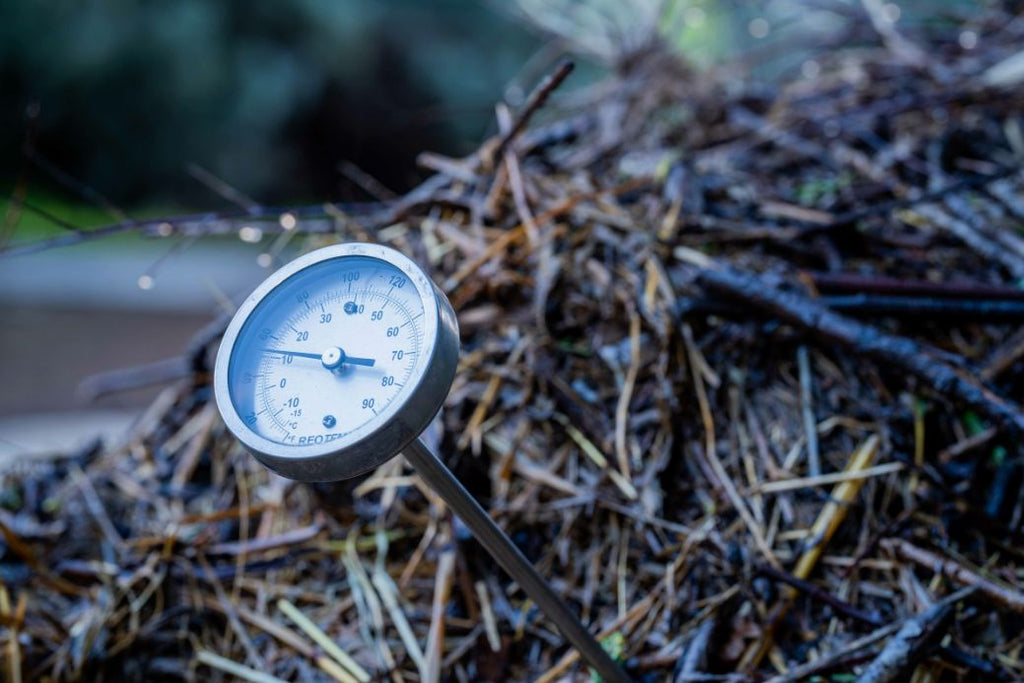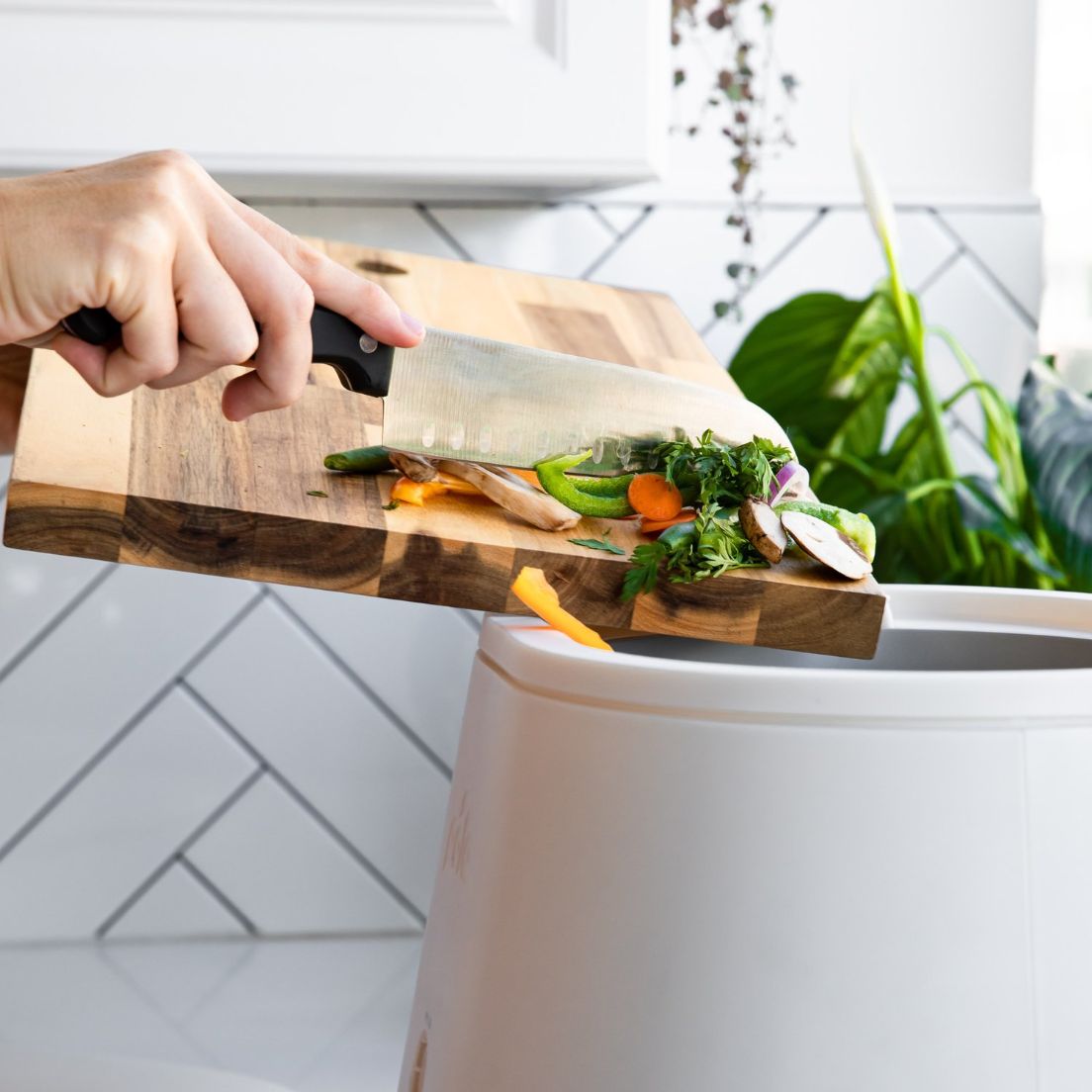
When it comes to healthy plants, knowing the difference between compost and manure is crucial. Both manure and compost can support a vegetable garden, but unlike manure, there’s no risk that fresh compost from an indoor composter or one found outside will harbor parasites or contaminants like E. coli. Let’s explore manure and compost in depth so that you’ll know which to use to support plant growth.
Table of contents
Similar to understanding the difference between compost and fertilizer, it’s valuable for gardeners (including those with a new green thumb) to know the benefits and drawbacks of animal manure and what comes out of a compost bin. Composted manure begins as a mixture of animal droppings and urine, whereas plant waste, food waste, and other organic materials are what go into the composting bin. Both manure and compost can be used as garden fertilizer—let’s take a look at how.
What is compost?

Compost is what happens when organic materials—food scraps, coffee grounds, plant waste, and other organic yard waste—are decomposed through natural decomposition and chemical processes. Once the organic materials are collected, they’re stored in the best indoor or outdoor composter for a given space. Here, with proper heat and aeration, the organic matter is transformed into a soil amendment.
Why do people create compost and compost tea? Well, for one, it boosts the nutrient content of soil by encouraging the production of healthy bacteria, which break down the organic material to create nutrient rich humus. It also provides an eco-friendly alternative to fertilizer, suppresses pests and diseases, and improves soil texture.
There are a lot of reasons people start a compost pile. However, there are some potential downsides to compost, too.
|
Pros |
Cons |
|
|
What is manure?

Fresh manure is a byproduct of pet, sports, and farm animals. Animal dung from many different plant-eating animals may be used, all having different pros and cons. Chicken manure and cow manure are readily available, whereas rabbit manure may be harder to come by. While you shouldn’t use pet or pig waste in vegetable gardens, nearly any other type of animal manure—whether it’s from alpacas, sheep, or goats—can be used to improve soil health.
Horse manure is most commonly used to support vegetable gardens and farms, as it’s easy to harvest and doesn’t potentially contain antibiotics like cow manure or chicken manure. An average horse will produce up to 55 pounds of manure every single day! When you compare horse manure vs compost from a nutritional standpoint (i.e. plant nutrients), you get a relatively similar NPK ratio, with a horse’s animal dung having slightly more nitrogen. However, some types of manure may provide too many nutrients.
In addition to a potential nutrient overload, there are some other cons and pros to be aware of.
|
Pros |
Cons |
|
|
How manure is used in a vegetable garden
Prior to use in vegetable gardens, a manure pile must be processed to remove contaminants like E. coli and Salmonella. To process manure, heat must be applied. The process of hot composting may be used. In this case, the compost is mixed with animal bedding, straw, dead grasses, or in some cases, woody materials. Like a traditional compost pile, it will reach high temperatures over the span of several weeks, which kills bacteria.
In addition to controlling potential for bacteria, it’s also important to consider potential contaminants that are mixed into the manure pile. In addition to animal droppings, fresh manure sourced from a farm may contain animal bedding or spilled feed, which could alter the quality of the manure. It may also contain weed seeds—which could be disastrous for your spring planting!
After controlling for some of these contaminants, you can consider manure as feed for your garden. For most effectiveness, it should be tilled into soil. As a soil amendment, it supplies essential plant nutrients nitrogen, phosphorus, and potassium. It also improves soil structure by increasing organic matter. Especially helpful for sandy soils, soil amendments like composted manure improve the water holding capacity while also boosting soil’s water filtration ability—which is great for denser clay soils.
What’s the difference between compost and manure?

The key difference between manure and compost is that manure is feces (sometimes urine) sourced as a byproduct from raising animals, while compost is organic matter that’s undergone a natural decomposition process. Both provide nutrient content for plants, but they may be used for different reasons.

Is compost or manure better for your garden?

Manure and compost both have their benefits and drawbacks. However, for the average homeowner and gardener, compost piles are generally a better solution for not just transforming organic waste into something beneficial, but also as an easy—and safer—way to support a healthy vegetable garden.
Compared with manure, fresh compost has a nice earthy smell. As the natural decomposition process doesn’t necessarily need to reach high temperatures to kill contaminants like Salmonella and E. coli, using a large or small compost bin may be better suited for those who don’t have the time or space to compost manure.
In addition to requiring regular turning, the heat required to compost manure makes it difficult to do at home. While composted manure is available for purchase, it isn’t practical for those who don’t live in agricultural regions—or don’t want to deal with the smells that come with fresh manure.
It’s also important to realize that animal manure may take a while before it’s able to support plant health with nutrients like nitrogen. This is because a plant’s nutrient uptake is dependent upon beneficial microbes, which must decompose the organic matter in manure. In general, only about 30-50% of the organic nitrogen is available for nutrient cycling in the first year after manure is applied.
Try Lomi for a convenient way to recycle your food waste at home

Does maintaining a backyard compost pile or coming into contact with fresh manure sound smelly and difficult? You’re not the only one who thinks so. In recent years, more households have been turning to odor-free and easy ways to compost—via an electric composter.
Written by: Heather Seely
